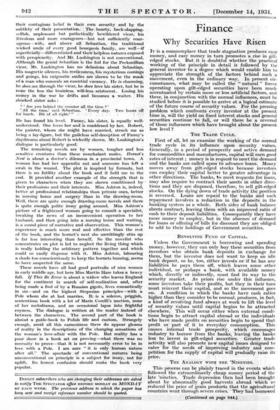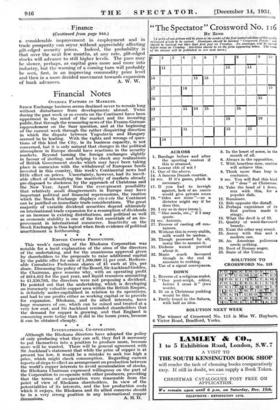Finance
Why Securities Have Risen
IT is a commonplace that trade stagnation produces easy money, and easy money in turn promotes a rise in gilt- edged stocks. But it is doubtful whether the practical working of the principle in detail is followed by the general investor to a degree which would enable him to appreciate the strength of the factors behind such a movement, even in the ordinary way. In present cir- cumstances, what may be called the " natural " forces operating upon gilt-edged securities have been much accentuated by certain more or less artificial factors, and these, in conjunction with the normal influences, must be studied before it is possible to arrive at a logical estimate of the future course of security values. For the pressing problem which confronts every investor at the present time is, will the yield on fixed interest stocks and general securities continue to fall, or will there be a reversal of those influences which have brought about the present low level ?
THE TRADE CYCLE.
First of all, let us examine the working of the normal trade cycle in its influence upon security values. Generally, in a period of prosperity and active demand for commodities and manufactures, capital will earn good rates of interest ; money is in request to meet the demand and the banks are called upon to advance loans. Money moves away from gilt-edged stocks because investors can employ their capital better to greater advantage in other directions. The banks, to meet requests for loans, may also require to contract their assets in other direc- tions and they are disposed, therefore, to sell gilt-edged stocks. On the dying down of trade activity the position is reversed. Loans are repaid to the banks and such repayment involves a reduction in the deposits in the banking system as a whole. Both sides of bank balance sheets contract, leaving them with an improved ratio of cash to their deposit liabilities. Consequently they have more money to employ, but in the absence of demand for loans or offering of bills for discount they are obliged to add to their holdings of Government securities.
REVOLVING FUND OF CAPITAL.
Unless the Government is borrowing and spending money, however, they can only buy these securities from investors who obtain bank deposits in exchange for them, but the investor does not want to keep an idle bank deposit, so he, too, either invests or if he has any liabilities he pays them off, which leaves some other individual, or perhaps a bank, with available money which, directly or indirectly, must find its way to the security market. As prices rise under this influence, some investors take their profits, but they in their turn must reinvest their capital, and so the movement goes on. A condition in which the banks have cash ratios higher than they consider to be normal, produces, in fact, a kind of revolving fund always at work to lift the level of security Values until capital begins to be attracted elsewhere. This will occur either when external condi- tions begin to attract capital abroad or the individuals who have made profits on securities begin to spend that profit or part of it in everyday consumption. This causes internal trade prosperity, which encourages industry to borrow from the banks, leaving the banks less to invest in gilt-edged securities. Greater trade activity will also promote new capital issues designed to cater for the needs of improving industry and com- petition for the supply of capital will gradually raise its price.
THE ANALOGY WITH THE 'NINETIES.
This process can be plainly traced in the events which followed the extraordinarily cheap money period of the late 'nineties. Trade depression then had been brought about by abnormally good harvests abroad which so reduced the price of grain products that the agricultural countries went through severe crises. They had borrowed (Continued on page 944.)
- Finance
(Continued from,page 942.) on the strength of high ?rites and good 'profits, and when these disappeared some of them got into difficulties, notably-South-America • and Australia; The result was a discrimination (not backed by an official embargo, how- ever). against:.. capital issues for oversea emplqyment. . Industry at-home no longer found -a demand for railway material and other goods in the countries whose develop. ment -was 'so severely checked, and, bank advances con- tracted. Money was extremely cheap and Consols . their record high price of just under. 114,, Gradually, however, industry began to revive, aided by Government expenditure in the South African War, and the steady decline in gilt-edged stocks began which. proceeded until the outbreak of war, when, of course, they fell cata- strophically. • CASH SUPPLIES ENLARGED. . .
At the present time we have somewhat similar condi- tions, but on a much bigger scale. There is more money and there are- also more securities. The world is much more developed and the supply of goods' is greater, so that a surplus, whether due to over-production or lack of purchasing power on the part of a big proportion of the world's population, has all the more effect on prices. After the crisis of 1981, when this conntry, went off the gold standard, a policy of cheap money was adopted some six months later. It was adopted in company with an Exchange Equalization Fund, into the detailed working of which it is not necessary to enter. It is sufficient to say that the result was to increase the quantity of bash in the hands of the banks and so to give them larger cash ratios in the same way as if loans had been paid off. The banks had to find employment for this money and they began to purchase gilt-edged stocks.
BANK PURCHASES OF SECURITIES.
They, had been obliged to sell securities after the 1931 crisis, and the investments of the ten clearing banks had in February, 1982, fallen to just under £280,000,000. By September, 1932, their holdings had risen by £100,000,000, this movement just about balancing the contraction in their ordinary loans and advances, while their deposits had grown by more than £150,000,000, practically all of which had gone into additional discounts which were mainly Treasury Bills. Their bill holdings reached a maximum figure in January, 1933, at £430,000,000, but since then there has been steady contraction, partly the result of the Treasury's policy of • consolidating its floating debt. At the same time, the ordinary advances of the banks have continued to contract, with the result that they have been forced to put more and more money into gilt-edged-securities. In the latest monthly averages the ten clearing banks' figures show that between them they now hold nearly £590,000,000, a rise of over £800,000,000 in three years. Since the crisis of 1981 there has not been a creation of new Government securities to anything like this extent, so that in the main the banks bought these securities from the public,' which has thus been in possession of money to Invest elsewhere. But if the public buys securities in the market, somebody else • sells, and so the fund of surplus capital goes on forcing prices up. When new issues are made for directly reprodnctie purposes, such as the extension of electric light works or the building of new factories, the money is taken from the capital fund and-passes into -circulation, although it is still there and eventually comes back to the banks.
WHEN STOCKS WILL FALL.
Thus cheap money, in the firs' t pliee, acts Upon the security market and subsequently upon' the labour market and the commodity price level. At present there is no sign that capital is being diverted on such a. scale as would threaten the maintenance of the price level of the gilt-edged market, but the seeds of this diversion of capital are beginning to grow, as is apparent in the increasing amount of new securities offered for sub- scription. • The volume of money seeking employment, however, is so great that it seems probable that quite (Continued On page 946.)
- Finance
' (Continued from page 944.) a considerable improvement in employment and in trade prosperity ,can, ocpur without appreciably affecting gilt-edged security prices. Indeed, the probability, is that over the next few months, at any rate, gilt-edged stocks Rill advance to still higher levels. The pace may be slower, perhaps, as capital goes more and more into industry, but the warning of a coming turn will probably be seen, first, in an improving commodity price level and then in a more decided movement towards expansion









































 Previous page
Previous page